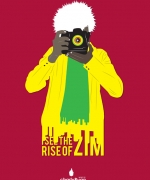The complexity of race and skin colour perceptions in Afrika
I was lucky I suppose, that I discovered it at all. Many foreigners come to Afrika and never really get to hear what locals think of them and their time spent on the continent. And many foreigners leave with a distorted sense of what they ‘understand’ about the culture they’ve spent 3-6 weeks or months volunteering in.
I’d like to think that I’ve had a deeper view, a peek under the surface, thanks to a few incredible friends that I made in my time in Zimbabwe. Friends that would eventually let me know that to them; I wasn’t Black. Despite the fact my dad is Afrikan-American. Despite the fact that he was abused, beat up, and disrespected by a white institutional racism similar to the one colonized Afrikan countries have endured for centuries. Despite the fact that I grew up with militant, angry black uncles and aunties, and that my grandmother was a domestic her entire life. Despite all that, to my Zimbabwean friends I am still seen as a murungu. Not a sister in the struggle. Not a kindred spirit. Before they see my color, they see my “foreignness”. My status as a person from a wealthy country.
I didn’t realize how little being “Black” means anywhere outside of America until I came to the one place where I thought “Black” was how we all identified ourselves. You see, in America, because we have no tribes, no oral history, no sense of where we come from (thank you slavery) – there is no nationality. There is no identifying someone as Zimbabwean, Nigerian, Ghanaian, Zambian. Slavery separated families, mothers, sons, husbands and wives – scattered them across the continent, never to be seen again. Oral histories were lost. Bloodlines broken. Any semblance of knowing where your grandmother came from – completely gone. I don’t even know my great-grandmother’s or great-grandfather’s name, much less their origins.
So, for centuries, there has only been “Black”. We are all Black. Historically, if we had one drop of blood of Afrikan descent, we were discriminated against as if we were fully Afrikan. The fact that I am only half black (and half Chinese) means that when the time to look for a job, get a loan, or get into university comes, I am still and always will be considered “Black”, and generally considered “less than”.
That consistent oppression over the last three centuries has created a consistent, if reconstructed identity. An identity, rooted in prejudice, nevertheless gave us something to be connected to, something to be a part of - a makeshift tribe if you will.
We came together culturally, to create our own new heritage that includes everyone – blue-black, brown, caramel and in-between. We take solace in knowing that we’re all connected – somehow.
So imagine the dismay I felt when I discovered that in Afrika, “Black” doesn’t mean anything. Many Black people in America have an unspoken whimsical fantasy that one day, we’ll return to Afrika and discover where we come from. That the continent will welcome us back ‘home’ and, for those lucky enough to travel there, we’ll acquire some renewed sense of deep-rooted identity. That in some metaphysical sense, we’ll reconnect with who we are. Who our ancestors are. Where we belong.
Not to say that’s what I came to Zimbabwe for – I honestly kind of fell into the country wide-eyed and bushy-tailed (true story: I’d never heard of Robert Mugabe). But the people I met very quickly made me feel welcome. The culture was familial, friendly, community-based, homey – all the positive things we associate with traditional ‘Black” culture in America. Cultural traits you rarely see in the large urban cities I’ve been living in the past 10 years. It didn’t take long to make real connections with some amazing friends. To feel like this was family. So I assumed that of course we were all Black. They saw themselves the same way I did. Sure we came from different countries, but hey – oppression is oppression right? Apparently not.
To my friends who regularly hang out with other expats who are actually white (i.e. of European descent – or straight from Europe), I may have been different because of the melanin in my skin and my attitude. But to the average Zimbabwean – the guy who I called for a taxi, the one who served me food at Gava’s, the domestic who cleaned my friend’s house – to them, I was just another Murungu. And it wasn’t until I had a (painfully) honest conversation with my ‘salad’ friends, that I discovered, when push comes to shove, even they saw me as a foreigner first, and a ‘black person’ a distant second.
It was a blow, I have to admit. I didn’t believe the first one who told me. But the second, and the third, and the fourth convinced me. They helped me understand how myopic the American view is. The way “Black” people see the world in America, on some level, crushed me. There is a beauty in knowing your roots. A grand, connected to the universe, timeless reassurance of knowing where your ancestors came from. A steadiness, a sense of comfort, a security in the old ways, old languages, old traditions. Traditions and languages we, in America, are wildly grasping for – and gradually giving up on, when we realize the echoes of the past become more and more distant with each passing generation.
I am jealous. Deeply jealous that my friends in Afrika know where their parents and their parent’s parent’s come from. Regardless of how strongly they adhere to or subscribe to the old traditions – they HAVE them. There are stories behind the superstitions. Reasons behind the cultural norms. A memory as old as time to guide them along their journey towards creating a new generation, built upon an ever-growing foundation that stretches deep down into the soil of the earth from which they came from and will one day return.
I am now irrevocably aware that my roots are tenuous, shallow, and fabricated from the little my enslaved ancestors were able to salvage from the wreckage of our own history. Maybe that’s why I keep coming back to
the continent.
My friends laugh and say no one is surprised any longer when I pop back up in Zimbabwe after being gone for a month, a few weeks, here and there. But in the short time there, somehow it feels like home. Like there’s a distant thrumming - a vibration that feels right. Like a radio frequency that plays a song you barely remember but could never forget.
It wasn’t until I realized how fabricated the identity we’ve created in America truly was, that I was able to truly appreciate the sense of home I now feel in Zimbabwe. So I thank my friends for being honest, and letting me know I’m a Murungu. They trusted me enough to tell me the truth. Because even though I’m not one of them, it’s enough that I am part of the family, even if I might just be that distant cousin that you just call aunty because no one knows who she’s actually related to.



